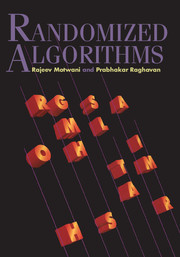Book contents
- Frontmatter
- Contents
- Preface
- I Tools and Techniques
- 1 Introduction
- 2 Game-Theoretic Techniques
- 3 Moments and Deviations
- 4 Tail Inequalities
- 5 The Probabilistic Method
- 6 Markov Chains and Random Walks
- 7 Algebraic Techniques
- II Applications
- Appendix A Notational Index
- Appendix B Mathematical Background
- Appendix C Basic Probability Theory
- References
- Index
3 - Moments and Deviations
from I - Tools and Techniques
Published online by Cambridge University Press: 05 March 2013
- Frontmatter
- Contents
- Preface
- I Tools and Techniques
- 1 Introduction
- 2 Game-Theoretic Techniques
- 3 Moments and Deviations
- 4 Tail Inequalities
- 5 The Probabilistic Method
- 6 Markov Chains and Random Walks
- 7 Algebraic Techniques
- II Applications
- Appendix A Notational Index
- Appendix B Mathematical Background
- Appendix C Basic Probability Theory
- References
- Index
Summary
IN Chapters 1 and 2, we bounded the expected running times of several randomized algorithms. While the expectation of a random variable (such as a running time) may be small, it may frequently assume values that are far higher. In analyzing the performance of a randomized algorithm, we often like to show that the behavior of the algorithm is good almost all the time. For example, it is more desirable to show that the running time is small with high probability, not just that it has a small expectation. In this chapter we will begin the study of general methods for proving statements of this type. We will begin by examining a family of stochastic processes that is fundamental to the analysis of many randomized algorithms: these are called occupancy problems. This motivates the study (in this chapter and the next) of general bounds on the probability that a random variable deviates far from its expectation, enabling us to avoid such custom-made analyses. The probability that a random variable deviates by a given amount from its expectation is referred to as a tail probability for that deviation. Readers wishing to review basic material on probability and distributions may consult Appendix C.
Occupancy Problems
We begin with an example of an occupancy problem. In such problems we envision each of m indistinguishable objects ("balls") being randomly assigned to one of n distinct classes ("bins"). In other words, each ball is placed in a bin chosen independently and uniformly at random.
Information
- Type
- Chapter
- Information
- Randomized Algorithms , pp. 43 - 66Publisher: Cambridge University PressPrint publication year: 1995
Accessibility standard: Unknown
Why this information is here
This section outlines the accessibility features of this content - including support for screen readers, full keyboard navigation and high-contrast display options. This may not be relevant for you.Accessibility Information
- 2
- Cited by
